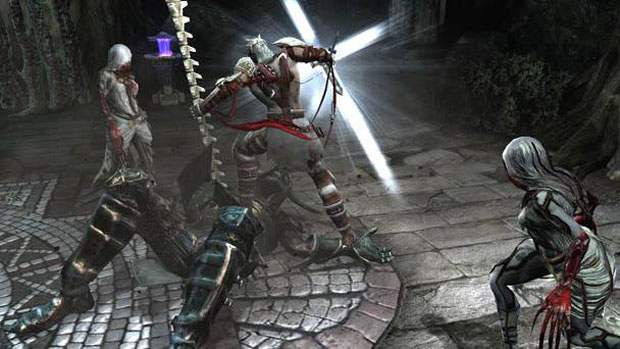When Dante Alighieri wrote, cultures leapt from his pen. His style carved the Italian language, his commentary shook a fractured state, and his subject immortalized the nine circles of hell.
In his predominant work, The Divine Comedy, Dante depicted himself as a quiet, cravenly, old man. Donning in a laurel wreath, with a visage starkly pensive, the poet became an icon of Italian literature.
The Inferno, first in the Comedia’s series of three, depicts Dante’s walk through one Christian afterlife, incorporating mythology, literature, and philosophy in an unprecedented way. His work changed the way we think.
Yet Dante’s times are past. Now, 700 years after the poet’s death, something dark encroaches upon his legacy.
On Feb. 9, Electronic Arts and Visceral Games released “Dante’s Inferno: The Video Game.” This alone is enough to inspire fear in the scholar’s heart. But the video game has taken unimaginable liberties with Dante’s text.
Dante Alighieri, the peaceful man of deep contemplation, has become Dante the Crusader, a bulging, grossly masculine idol of violence.
Alighieri’s original Inferno describes his pilgrimage through hell, guided by the poet Virgil and taken at the behest of Dante’s unrequited love, Beatrice, who waits for him in Paradise. The pair comes to Satan frozen in the circle of Treachery, and climbs his body to Purgatory.
EA seriously contorted the story. Satan steals Beatrice away at the game’s start, and Dante the Crusader follows in her wake, delving to the deepest circle of hell to save his fiancé from the clutches of evil, choosing to slaughter or absolve sinners along his way.
Dante’s power in hell is the most egregious change made by EA, for the book presents Dante as a minor being in a larger world, with little control over what divinity works around. Only by invitation does he walk alive in hell, and, while there, he can but ask questions of the tortured, having neither right nor will to cause further suffering.
Max Asencio (’11) thought the game “insulting …. It’s a really brute way to pigeon-hole that name because it’s a name that people know … but not many people have actually read (the book).”
Rene Villacana, Lick-Wilmerding High School’s Dante Club adviser, noted that, “fundamentally, it’s a videogame, and (its) producers… want the game to sell …. If there’s some destruction … some violence … some special effects, there’s going to be an audience to play it …. It kind of has nothing to do with Dante.”
Throughout the game, we see Dante confront progressively more obscene denizens of hell. From the horribly malformed Cerberus in Gluttony, to the visually exaggerated prostitutes of Lust, EA has made its best attempt to incite repulsion at our core.
Some say medieval society thought the book just as vulgar as we think the game now. Yet Dante mourned the sins of man, whereas EA revels in them. Not only this, but he considered the deepest questions we face as human beings: What is moral? What is evil? Why does man succumb to sin? Dante being such a rich character, why did EA choose to so warp his person?
“Real Dante was in Florence during a civil war – he was a politician,” noted Jonathan Knight, executive producer and creative director for Dante’s Inferno. “We wanted something a little bit more.” One EA press release said the crusader was “inspired by the real Dante Alighieri, but adapted for a new generation.” This begs the question: What does that say about our generation? And what would Dante Alighieri himself think of EA’s hell? What exactly was his walk through fire and ice? Why does his story still brood at our core?
In Limbo, where “sighs, with lamentations and loud moans, / Resounded through the air pierced by no star … e’en (Dante) wept at entering. Various book, and, lights and screams aflame, we “descend to the blind world” tongues … outcries of woe, / accents of anger, voices deep and hoarse … Made up a tumult, that forever whirls / Round through the air” (Inferno, Canto III, lines 21-29).
As the Crusader swings his scythe, and players tap at their controls, Dante Alighieri weeps. Thus greed stifles art, an age burns a book, and, lights and screams aflame, we “descend to the blind world” (Inferno, Canto IV, line 12).

